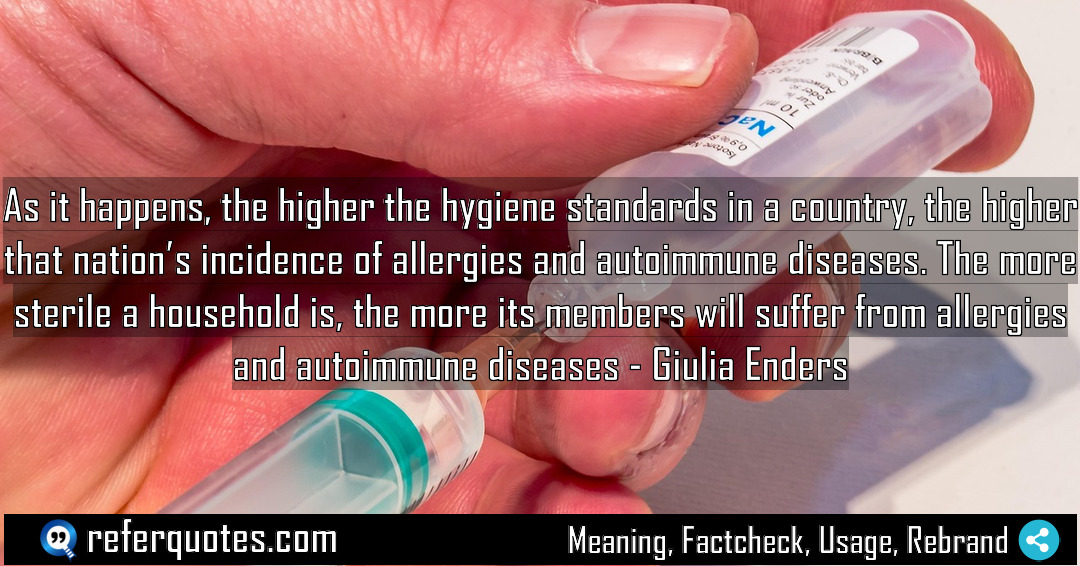You know, it’s fascinating. As it happens, the higher the hygiene standards, the more we see this strange paradox where our super-clean environments might be making us sicker in a different way. It’s a concept that completely flips our modern obsession with sterility on its head and forces us to reconsider our relationship with germs.
Share Image Quote:Table of Contents
Meaning
The core message here is a real head-scratcher: our drive for ultra-cleanliness might be backfiring, leading to a higher prevalence of allergies and autoimmune diseases.
Explanation
Okay, so let’s break this down. Think of your immune system as a young, inexperienced army. It needs training. It needs to see a wide variety of microbes—the good, the bad, the harmless—to learn what’s a real threat and what isn’t. When we live in overly sterile environments, that army never gets properly trained. It gets bored, essentially. And a bored army starts looking for fights, turning on harmless things like pollen or even the body’s own cells. That’s the premise of the “Hygiene Hypothesis,” which is what Enders is referring to. It’s not that hygiene is bad, it’s that we’ve taken it to such an extreme that we’re depriving our immune systems of the essential data they need to develop correctly.
Quote Summary
| Context | Attributes |
|---|---|
| Original Language | English (translated from German) (39) |
| Category | Health (243) |
| Topics | immunity (4) |
| Literary Style | expository (8) |
| Emotion / Mood | cautious (33) |
| Overall Quote Score | 36 (1) |
Origin & Factcheck
This insight comes directly from Giulia Enders’ bestselling 2014 book, Gut: The Inside Story of Our Body’s Most Underrated Organ, which was originally published in German. She’s synthesizing decades of research, notably the “Hygiene Hypothesis” first proposed by David P. Strachan in 1989. While the core idea is scientifically supported, it’s sometimes misattributed to earlier thinkers; Enders’ genius was in making this complex immunology so accessible and personal to a general audience.
Attribution Summary
| Context | Attributes |
|---|---|
| Author | Giulia Enders (41) |
| Source Type | Book (4032) |
| Source/Book Name | Gut: The Inside Story of Our Body’s Most Underrated Organ (41) |
| Origin Timeperiod | Contemporary (1615) |
| Original Language | English (translated from German) (39) |
| Authenticity | Verified (4032) |
Author Bio
Giulia Enders is a physician and author who makes gut science vivid and practical. She studied medicine at Goethe University Frankfurt and captivated audiences with award‑winning Science Slam talks before publishing Darm mit Charme, translated worldwide as Gut. She explains how the microbiome influences digestion, immunity, and mood, and offers realistic ways to care for it. Her approachable style, aided by illustrations from her sister Jill, has inspired millions to rethink everyday health. For her major titles and translations, see the Giulia Enders book list.
Where is this quotation located?
| Quotation | As it happens, the higher the hygiene standards in a country, the higher that nation’s incidence of allergies and autoimmune diseases. The more sterile a household is, the more its members will suffer from allergies and autoimmune diseases |
| Book Details | Publication Year: Revised edition ~2018; ISBN-13: 978-1771643764; ~293 pages |
| Where is it? | Goodreads list — no exact page given. :contentReference[oaicite:2]{index=2} |
